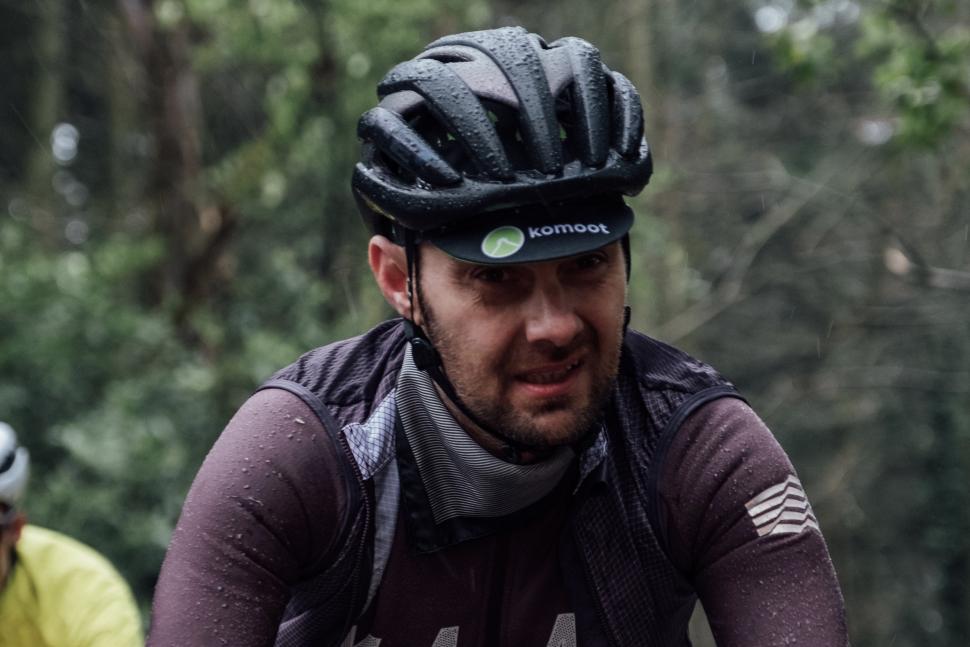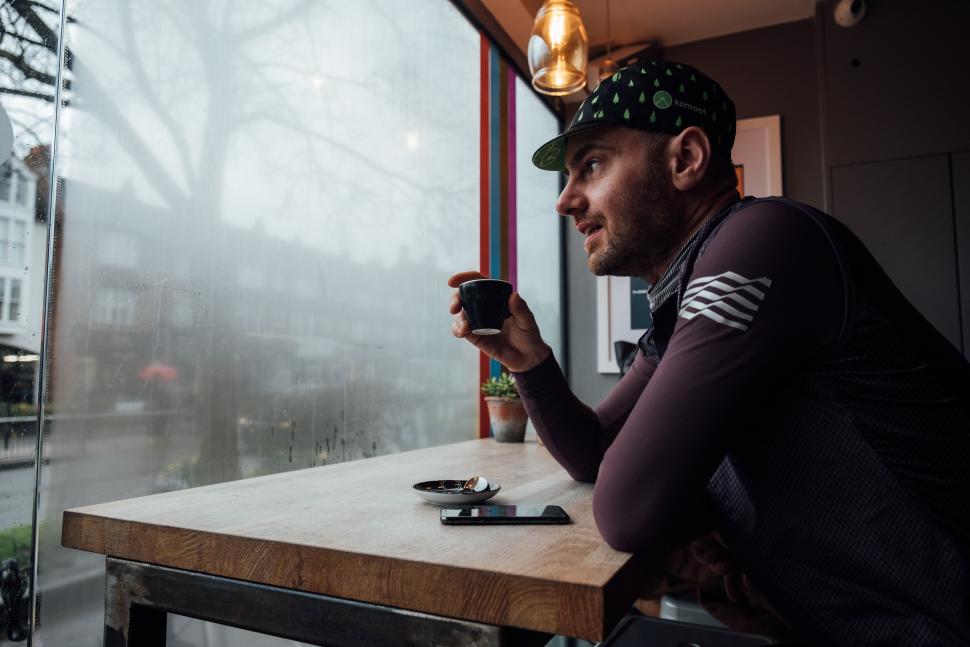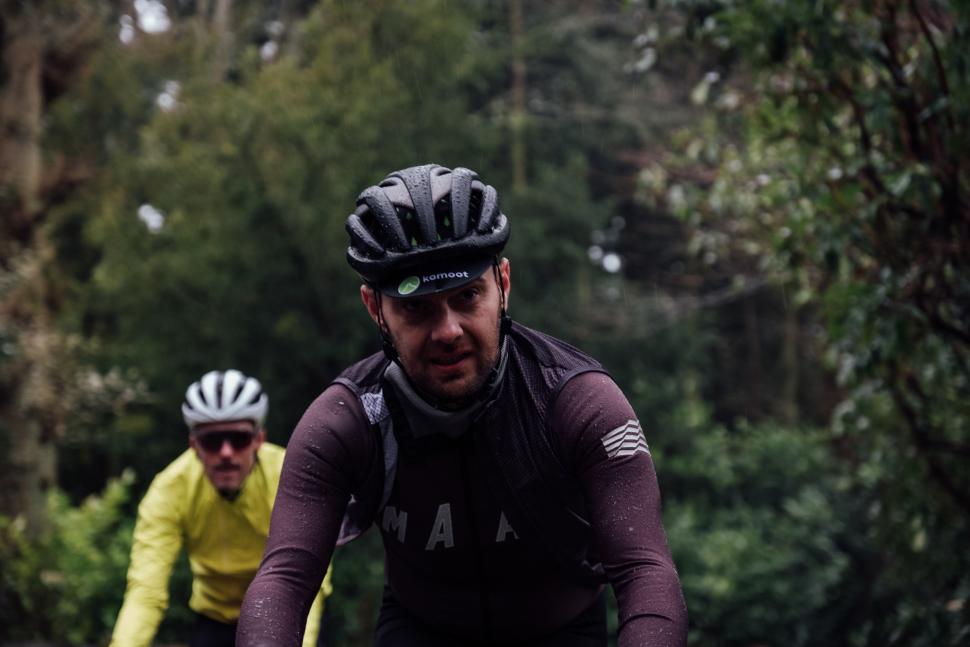- News
- Reviews
- Bikes
- Components
- Bar tape & grips
- Bottom brackets
- Brake & gear cables
- Brake & STI levers
- Brake pads & spares
- Brakes
- Cassettes & freewheels
- Chains
- Chainsets & chainrings
- Derailleurs - front
- Derailleurs - rear
- Forks
- Gear levers & shifters
- Groupsets
- Handlebars & extensions
- Headsets
- Hubs
- Inner tubes
- Pedals
- Quick releases & skewers
- Saddles
- Seatposts
- Stems
- Wheels
- Tyres
- Tubeless valves
- Accessories
- Accessories - misc
- Computer mounts
- Bags
- Bar ends
- Bike bags & cases
- Bottle cages
- Bottles
- Cameras
- Car racks
- Child seats
- Computers
- Glasses
- GPS units
- Helmets
- Lights - front
- Lights - rear
- Lights - sets
- Locks
- Mirrors
- Mudguards
- Racks
- Pumps & CO2 inflators
- Puncture kits
- Reflectives
- Smart watches
- Stands and racks
- Trailers
- Clothing
- Health, fitness and nutrition
- Tools and workshop
- Miscellaneous
- Buyers Guides
- Features
- Forum
- Recommends
- Podcast
feature
 Nick Frendo, Movember Mental Health Ambassador
Nick Frendo, Movember Mental Health AmbassadorCycling and mental health: How to get help & 15 signs someone needs help
In March 2020, Movember Mental Health Ambassador Nick Frendo attempted to cycle 4,382 kilometres. That number - 4,382 - represents the number of men in the UK who took their own lives in 2017; Nick says he was almost number 4,383. While his challenge was unfortunately curtailed by coronavirus restrictions at the time, the message about mental health that Nick is dedicated to spreading is still as relevant and necessary as ever. Nick spoke to road.cc’s Matt Lamy about why being in isolation shouldn’t mean being isolated.
road.cc: Why did you attempt to ride 4,382 kilometres?
Nick Frendo: The main reason I rode was to raise money for men’s charity, Movember. But I rode that specific distance because my connection with Movember is mental health and suicide prevention, and back in 2017 I twice tried to take my own life. That year, 4,382 men took their own lives in the UK, so that’s why I chose that distance.
road.cc: Tell us a little more about your story? Why did you get to a point in your life where you wanted to end it?
Nick Frendo: There were so many different reasons for it. Growing up, I struggled to find a purpose. I couldn’t really maintain relationships or friendships – I just never really seemed to get anything in life right. Then, when I finally thought I’d achieved it with a successful cycle touring business and a family, it all crashed down badly and I eventually ran away and isolated myself. I got to the point where I wouldn’t talk to anyone about anything. I made my situation an awful lot worse by doing that.
Then it all came to a head. I found myself sat in my house, all by myself, analysing, criticising, finding everything that I could that I thought was wrong with me. I took the decision that I was of no use to anyone and I would keep destroying myself and other people’s lives, so what was the point of carrying on?
I went out for a bike ride with the aim of not returning. I went down my favourite descent in Girona on the wrong side of the road going as fast as I could, hoping I’d see a car. Fortunately I didn’t. After that I realised I needed help.
road.cc: What were your first steps to find that help?
Nick Frendo: I’d already looked at getting professional help previously but never really felt like it worked. I hadn’t found the right therapist and it wasn’t really getting to the root of what my issues were. After the first attempt, it didn’t work for me. But after my second suicide attempt, I got emergency treatment and a very kind customer of mine at the time helped me out with a therapist.
That seemed to work but there was a year between me seeking help and then actually doing something concrete about it. I still hadn’t told anyone what I had done. I still hadn’t really accepted it myself. Although I was feeling better about where I was and what was going on, I still had a cloud over me and that cloud was that I was still bottling a lot of stuff up and not really telling my girlfriend or my kids or family and friends.
road.cc: What made the difference?
Nick Frendo: Eventually I came back to London and I started riding with a lot of people who were younger than me. They appeared very open and they just talked. Eventually I was letting stuff slip, but bizarrely, as I was letting stuff slip, I was also feeling a lot better. Then I actually started talking to people properly and telling them how I was feeling and what I had done.
Then I decided to do a ride – I felt I wanted to do something and raise some money for charity – so I came up with a ride where I was going to ride across the Pyrenees, the Alps, the Dolomites and raise as much as I could for Movember. But I thought I could only do that and be genuine if I told people why I was doing it. That led me to telling everyone in my life what I had done and how I was. Then I opened up publicly and set out on this mission to help others.
How to spot the signs when it's more than just 'feeling a bit down':
- Continuous low mood or sadness
- Feeling hopeless and helpless
- Having low self-esteem
- Feeling tearful
- Feeling guilt-ridden
- Feeling irritable and intolerant of others
- Having no motivation or interest in things
- Finding it difficult to make decisions
- Not getting any enjoyment out of life
- Feeling anxious or worried
- Having suicidal thoughts or thoughts of harming yourself
- Changes in appetite
- Unexplained aches and pains
- Lethargy
- Disturbed sleep
(Source: NHS)
road.cc: One of the interesting things about your story is that, when you were at your lowest, cycling was almost part of the problem because your job, your hobby and your life was all wrapped up in it. Cycling can be quite a solitary pursuit – how important is it to make sure you involve people in your life?
Nick Frendo: For me, now that I’m a mental health ambassador for Movember, a lot of people who approach me are other cyclists. They just want to talk and I think I can now use cycling as a vehicle to spread my message. I think there is a lot of people, a bit like me, who have just started talking almost by accident to people they meet as they ride.
Every now and then when I was a tour guide, I would get quite uncomfortable because someone would start opening up to me when we were on a trip. We might be going up a climb and they had buried themselves getting to the top, they were mentally exhausted, they were physically broken, and I guess they felt quite vulnerable and they’d start talking. I always sort of felt, well, I’m just a tour guide, I’m not a therapist. But now I realise how important that is.
So, yes, I still ride a bike and I do it a lot, but the goal for me now is to reach people. I know there is a lot of people out there who are looking for help and looking for people to talk to, and cycling can make that really easy. If I can show what I have gone through and where I am now, I just hope I can inspire a few people to not isolate themselves like I did, not run away from whatever is troubling them, but just to reach out.
Professional help isn’t necessarily the answer for everyone – sometimes just a shoulder or a mate checking in with you. The whole cycling community is pretty incredible. I’ve turned up at various clubs and social rides and had people just start talking to me. That’s really encouraging and there’s a lot of people that just need a little nudge.
road.cc: What advice do you have for cyclists suffering mental health issues, or indeed anyone being affected by current events?
Nick Frendo: Talk to someone. There is always someone there – you’re never alone. That’s the main thing I found. I wanted to be alone, I didn’t want to confront my issues, I didn’t want to talk to people. I felt shame, guilt, all sorts of negative thoughts about myself. But I started talking to people and the support that came out to me was incredible.
For me, it’s about finding a community, a support network, people you can talk with who you feel comfortable saying you’re not feeling great today. And make the most of your daily exercise allowance to ride and take a break and distract yourself from the other issues you are facing. But talking, for me, has been the most incredible thing.
road.cc: Are what signs should we be looking for that suggest someone might be in trouble?
Nick Frendo: It’s not always obvious. I’m actually an introvert and quite quiet, so I found it really easy to hide, and people just assumed that’s the way I was and why I wouldn’t engage. But if you notice people are retreating, if they’re avoiding talking, if they’re isolating themselves – these are all tell-tales for somebody who is not feeling great.
I guess one of the important things is to ask someone if they’re OK. Nine times out of 10, if that person is like me, they’ll say, yeah, I’m fine. But actually you need to follow that up with ‘Are you really ok?’. You might get flicked off again, but the chances are that that second ‘Are you ok?’ will have a massive impact because that person then realises that you know they’re not fine. Asking twice is possibly the most important thing you can do.
Where to find help
- For general mental health, the NHS has a fantastic Your Mind Plan feature.
- For more direct help, other NHS services can be found here.
- For more urgent help, The Samaritans can be called for free on 116 123.
- Or get in touch with Mind on 0300 123 3393.
road.cc: And what can we all do to help the cause of suicide prevention?
Nick Frendo: Just listen. For me the most important thing is checking in. After I opened up about my problems, family and friends would check in. I wasn’t getting that before, but having a message from someone to say: ‘Are you OK?’ That can be huge and it still is.
It’s been a year and a half since I started out on this mission and people still check in on me. I’m still on a bit of a rollercoaster and I guess I probably always will be. But knowing that people care makes it much easier for me when I’m struggling to say, ‘I’m not OK today, can we have a chat?’
Latest Comments
- AidanR 2 sec ago
I thought that too, but apparently you can get safety compliant bull bars. I'm sure they're safe relative to the ones that became popular in the...
- David9694 6 min 56 sec ago
Driver hospitalised after flipping car onto roof in Swindon street...
- chrisonabike 23 min 51 sec ago
Granted, given the width they didn't manage to quite block all the cycling access, but they tried...(from here - skip to the other side to see the ...
- Rendel Harris 31 min 34 sec ago
Your own link that you posted as evidence gave the 2.5 km figure. Perhaps you didn't read your own evidence in your desperate and pathetic attempts...
- HarrogateSpa 57 min 53 sec ago
I agree, TV coverage of three stages as a one-time-only does nothing for the sport of cycling.
- dh700 1 hour 25 min ago
One of, and maybe the only, redeeming value of the post-my-life culture, is that some of the adherents will do the cops' job for them -- which is...
- quiff 2 hours 8 min ago
You can both be right - the scheme was introduced by Labour, but the fines levied under it increased dramatically in 2023 under the Tories.
- slc 4 hours 6 min ago
Agreed, there was no supension. There were various modifications of the plan, and a long time before the Beafort Rd and Crews Hole Rd one way plan...
- Geoff H 6 hours 5 min ago
My only use for a camera is for "evidence". I only check it (& check before and after every ride) to make sure it is working. While I have had...
- Velo-drone 8 hours 2 min ago
I don't see anything in what they said to suggest that they even think about 3rd party reporting of dangerous driving as being part of the picture...


Add new comment
15 comments
Well done to Nick for opening up and sharing his story. Much respect.
I've always felt that the correct way of dealing with that is simply to tell yourself, "I won't do it today". No comment about tomorrow, or the future: just "I won't do it today, thanks".
Sadly for some (I'm blessed to say I know this from others rather than personal experience) the thoughts are so overwhelming it becomes "I must do it today because it's the only way I can see of stopping these thoughts."
Agreed. It's a good idea but not foolproof.
Men just aren't socialised to talk about their feelings. Bitter experience tells me that a man would rather talk about football, barmaids or interest rates long before he talks about feelings, any diversion will do. Encouraging the man in your life or a male friend or relative to be open is fraught with obstacles and obfuscation but please, please persist in giving them the space and be aware of things like non-dietary weight loss, vacillation and taking no pleasure from things that used to be a joy; they'll leave all too big a hole in your life when they're gone.
No gender stereotyping there, then?
None at all just facts, if you wish to make light of something so serious then that's a reflection on you.
Wasn't making light of it. But I personally would switch off more if someone started trying to talk about football, barmaids, or interests rates than if they started asking about my feelings.
Worth remembering that men are not predetermined to be like this, but the massive number of societally-driven messages about masculinity simply reinforce this stereotype. Men are normal human beings with feelings, wants and desires the same as others. Let us stop assuming first that they fit into any super specific categories like this.
Which is precisely why I said that men aren't socialised to discuss their feelings. I wish that it wasn't so but it is. I suppose it's only something that can be tackled one bloke at a time.
Top post, good advice, thanks Nick and Road.cc.
There is a line you can cross (I have) where cycling is part of the problem - or at the very least part of the way you avoid the problem. Pushing yourself on a bike can be a socially tolerated form of self harm and sometimes telling the difference between 'training' and 'draining' can be difficult. Cycling is a great place for high achieving depressives and compulsives to hide in plain sight!
Very good point I hadn't considered.
When you start to look at what defines self-harm, you realise that (as you say) a lot of the language and behaviour that's celebrated within club level cycling is associated with punishing ones self, or relieving tension through pain and 'suffering'. I was sat in a training about self-harm only a month ago where I suddenly realised this. Definitely made me assess the way I approach cycling.
Very well put. If you've lost that love of the scenery you take in crossing the crescent of a hill during a sunshine ride. Or stop chatting with that someone you smilingly cross paths with. It's a good time to reassess your mindset.
Cycling should be a beautiful way to experience the world around you. Enjoy it. Its not just for you adrenaline junkies.
Another approach to the "Are you OK?" question is to re-frame it slightly - ask "How are you feeling today" - it's specific and time-limited and both less easy to brush off with an automatic response and less intimidating because it's just today we're talking about, not your whole life.